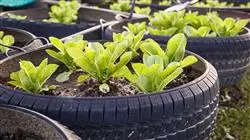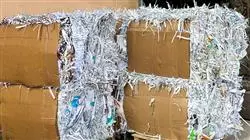University certificate
The world's largest faculty of engineering”
Introduction to the Program
Circular waste management allows us to work towards environmental sustainability. Don't think twice and join the fight against pollution"

The generation of waste generated by human activity is still pending a solution so as not to jeopardize the capacity of future generations. This is why there is a European Waste Policy. Inadequate waste management produces significant impacts on the receiving environments, generating adverse effects on water, soil and air, contributing to climate change, affecting ecosystems and of course human health.
This course provides the student with a solid knowledge of urban waste management, its sources and degree of production, the importance of minimization and the effects on the environment. Aspects related to landfill management and its significant environmental, social, visual and land degeneration impacts are included.
In addition, the circular economy is proposed as a formula for the correct management of waste with the main objective of promoting sustainability, both environmentally and economically. Therefore, it is proposed to reuse as many products as possible using as little energy as possible.
Specifically, this Postgraduate diploma will present the principles and characteristics of the circular economy, its advantages and its strategic vision. In this way, students are introduced to the efficient and sustainable use of water both at source (rainwater and graywater) and at destination (irrigation water or process water). Students will learn about the key factors in determining the revaluation of waste and/or sub-processes, including examples of entrepreneurship in this particular sector.
On the other hand, in order to understand the waste management and water engineering framework, it is essential to know the legal requirements on which it is based. The regulations concerning these environmental aspects are continually updated to adapt to changes in production and consumption.
It should be noted that since this is a 100% online Postgraduate diploma, the student is not conditioned by fixed schedules or the need to move to another physical location, but can access the contents at any time of the day, balancing their work or personal life with their academic life.
Do not miss the opportunity to take this Postgraduate diploma in Circular Waste Sustainability with us. It's the perfect opportunity to advance your career”
This Postgraduate diploma in Circular Waste Sustainability contains the most complete and up to date educational program on the market. The most important features of the program include:
- The development of case studies presented by Experts in Circular Waste Sustainability
- The graphic, schematic, and eminently practical contents with which they are created provide scientific and practical information on the disciplines that are essential for professional practice
- Practical exercises where the self-assessment process can be carried out to improve learning
- Its special emphasis on innovative methodologies in Circular Waste Sustainability
- Theoretical lessons, questions to the expert, discussion forums on controversial topics and individual reflection papers
- Content that is accessible from any fixed or portable device with an Internet connection
This Postgraduate diploma is the best investment you can make in selecting a refresher program to update your knowledge in Circular Waste Sustainability"
Its teaching staff includes professionals from the field of waste management, who contribute their work experience to this training program, in addition to renowned specialists from leading companies and prestigious universities.
The multimedia content, developed with the latest educational technology, will provide the professional with situated and contextual learning, i.e., a simulated environment that will provide immersive training that is programmed to train students in real situations.
This program is designed around Problem Based Learning, whereby the professional must try to solve the different professional practice situations that arise during the academic year. For this purpose, the professional will be assisted by an innovative interactive video system created by renowned and experts in Circular Waste Sustainability.
This training comes with the best didactic material, providing you with a contextual approach that will facilitate your learning"

This 100% online Postgraduate diploma will allow you to combine your studies with your professional work. You choose where and when to study"
Why study at TECH?
TECH is the world’s largest online university. With an impressive catalog of more than 14,000 university programs available in 11 languages, it is positioned as a leader in employability, with a 99% job placement rate. In addition, it relies on an enormous faculty of more than 6,000 professors of the highest international renown.

Study at the world's largest online university and guarantee your professional success. The future starts at TECH”
The world’s best online university according to FORBES
The prestigious Forbes magazine, specialized in business and finance, has highlighted TECH as “the world's best online university” This is what they have recently stated in an article in their digital edition in which they echo the success story of this institution, “thanks to the academic offer it provides, the selection of its teaching staff, and an innovative learning method aimed at educating the professionals of the future”
A revolutionary study method, a cutting-edge faculty and a practical focus: the key to TECH's success.
The most complete study plans on the university scene
TECH offers the most complete study plans on the university scene, with syllabuses that cover fundamental concepts and, at the same time, the main scientific advances in their specific scientific areas. In addition, these programs are continuously being updated to guarantee students the academic vanguard and the most in-demand professional skills. In this way, the university's qualifications provide its graduates with a significant advantage to propel their careers to success.
TECH offers the most comprehensive and intensive study plans on the current university scene.
A world-class teaching staff
TECH's teaching staff is made up of more than 6,000 professors with the highest international recognition. Professors, researchers and top executives of multinational companies, including Isaiah Covington, performance coach of the Boston Celtics; Magda Romanska, principal investigator at Harvard MetaLAB; Ignacio Wistumba, chairman of the department of translational molecular pathology at MD Anderson Cancer Center; and D.W. Pine, creative director of TIME magazine, among others.
Internationally renowned experts, specialized in different branches of Health, Technology, Communication and Business, form part of the TECH faculty.
A unique learning method
TECH is the first university to use Relearning in all its programs. It is the best online learning methodology, accredited with international teaching quality certifications, provided by prestigious educational agencies. In addition, this disruptive educational model is complemented with the “Case Method”, thereby setting up a unique online teaching strategy. Innovative teaching resources are also implemented, including detailed videos, infographics and interactive summaries.
TECH combines Relearning and the Case Method in all its university programs to guarantee excellent theoretical and practical learning, studying whenever and wherever you want.
The world's largest online university
TECH is the world’s largest online university. We are the largest educational institution, with the best and widest online educational catalog, one hundred percent online and covering the vast majority of areas of knowledge. We offer a large selection of our own degrees and accredited online undergraduate and postgraduate degrees. In total, more than 14,000 university degrees, in eleven different languages, make us the largest educational largest in the world.
TECH has the world's most extensive catalog of academic and official programs, available in more than 11 languages.
Google Premier Partner
The American technology giant has awarded TECH the Google Google Premier Partner badge. This award, which is only available to 3% of the world's companies, highlights the efficient, flexible and tailored experience that this university provides to students. The recognition as a Google Premier Partner not only accredits the maximum rigor, performance and investment in TECH's digital infrastructures, but also places this university as one of the world's leading technology companies.
Google has positioned TECH in the top 3% of the world's most important technology companies by awarding it its Google Premier Partner badge.
The official online university of the NBA
TECH is the official online university of the NBA. Thanks to our agreement with the biggest league in basketball, we offer our students exclusive university programs, as well as a wide variety of educational resources focused on the business of the league and other areas of the sports industry. Each program is made up of a uniquely designed syllabus and features exceptional guest hosts: professionals with a distinguished sports background who will offer their expertise on the most relevant topics.
TECH has been selected by the NBA, the world's top basketball league, as its official online university.
The top-rated university by its students
Students have positioned TECH as the world's top-rated university on the main review websites, with a highest rating of 4.9 out of 5, obtained from more than 1,000 reviews. These results consolidate TECH as the benchmark university institution at an international level, reflecting the excellence and positive impact of its educational model.” reflecting the excellence and positive impact of its educational model.”
TECH is the world’s top-rated university by its students.
Leaders in employability
TECH has managed to become the leading university in employability. 99% of its students obtain jobs in the academic field they have studied, within one year of completing any of the university's programs. A similar number achieve immediate career enhancement. All this thanks to a study methodology that bases its effectiveness on the acquisition of practical skills, which are absolutely necessary for professional development.
99% of TECH graduates find a job within a year of completing their studies.
Postgraduate Diploma in Circular Waste Sustainability
.
Discover the path to a sustainable future with the Postgraduate Diploma in Circular Waste Sustainability, a unique educational experience brought to you by TECH Global University. Are you ready to challenge the limits of sustainability and transform the world we live in? Immerse yourself in this virtual mode Postgraduate Diploma and acquire the skills you need to become an expert in waste management and the implementation of circular practices. As you explore the complexities of sustainability, you will discover innovative strategies to reduce, reuse and recycle resources, creating a positive impact on the environment and society. Our teaching team, comprised of leading professionals with extensive experience in the field of sustainability and waste management, will guide you through this fascinating educational journey. You will learn from their experience and expertise, and benefit from their practical, case-based approach. During the course, you will explore fundamental topics such as circular economy, integrated waste management, sustainable system design and innovative technologies. In addition, you'll have the opportunity to apply your skills and knowledge in practical projects, collaborating with peers from around the world and facing real-world challenges.
Open the door to a future full of opportunities.
Upon completion of this course, you will receive a Postgraduate Diploma in Circular Waste Sustainability certificate, endorsed by the prestigious TECH School of Engineering. This official recognition will validate your knowledge and open doors to a wide range of career opportunities in the field of sustainability, both nationally and internationally. Studying at TECH gives you a unique opportunity to specialize in an institution internationally recognized for its academic excellence and cutting-edge approach. Connect with a global community of students committed to sustainability and expand your professional network in an enriching environment. Are you ready to be part of the change? Join the Postgraduate Diploma in Circular Waste Sustainability at TECH Global University and become a leader of tomorrow, capable of designing innovative solutions for a more sustainable world.







